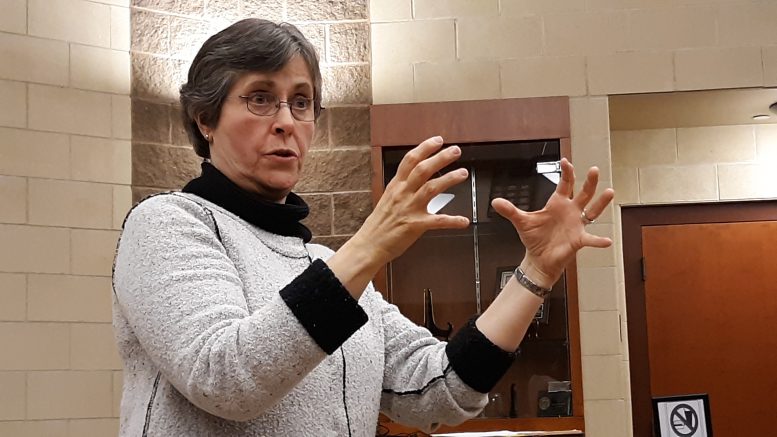By JAN LARSON McLAUGHLIN
BG Independent News
A federal judge has struck down an Ohio law allowing residents to move to neighboring school districts by holding a vote of petitioned areas.
That means the two areas of Bowling Green School District that voted in August to secede to Eastwood and Otsego school districts are now on hold.
“What we’re in now is a sort of limbo period,” Becky Princehorn, an attorney for BG Schools, reported to the board of education Tuesday evening. “For now, everything just stops.”
U.S. District Court Judge Michael H. Watson, in a decision issued Friday, struck down the state territory transfer law that residents of Hills and Dale used to try to leave Plain Local School District in eastern Ohio.
The controversial law – Ohio Revised Code 3311.242 – created a new method for residents in certain townships to more easily change their home school district, requiring only a petition by residents to seek the transfer and a majority approval on an election ballot by those same residents.
It was this law that allowed some areas surrounding Bowling Green to vote to secede to neighboring school districts in August.
The judge ruled the law violates Ohio’s Constitution because of the way the legislation was inserted in the state’s massive two-year budget bill.
“This is really good,” board member Norm Geer said. “I was impressed by the logic of the judge.”
“He basically called them out for sneaking around like they had something to hide – because they did have something to hide,” Geer said.
Because of the federal court decision, Bowling Green School Board did not take action Tuesday evening on a resolution to begin negotiations with neighboring townships about the property transfers.
“This is great news,” board member Bill Clifford said.
Princehorn explained that the judge found that the law was tactically inserted into the state’s budget bill – which was unrelated to the land transfer issue. So the ruling was “severed” from the budget bill, she said.
It can be reintroduced as a standalone bill in the future, and the defendants can appeal to a higher court within 30 days, Princehorn said.
The judge was very aware of the controversial nature of the case, Princehorn said.
“So he took some extra steps to lay out the evidence,” she said.
Bowling Green Superintendent Francis Scruci asked if the state may take into consideration the amount of tax dollars the district had to expend to deal with a law that has now been ruled unconstitutional.
Known as the fast-track transfer statute, the new law allowed residents to avoid state oversight. The state Board of Education denied the same request from Hills and Dale residents in 2004 after a state hearing officer concluded it was in the best interest of the affected students to remain in Plain Local School District. The decision was upheld by two courts.
The judge found fault with the way the legislators created and passed the law.
The fast-track transfer legislation was inserted into the 2,600-page, two-year state budget, without a name attached to it. The provision was removed and re-inserted at different points of the legislation process without any hearings or debate on its merits before being approved as part of the final budget bill.
Watson said the fast-track legislation should not have been added to the budget bill because it had no legitimate relationship to the state budget and because it was controversial enough and substantial enough to warrant specific consideration by the legislature prior to passage.
As part of his decision, Watson separated the fast-track transfer statute from the budget bill and ruled the fast-track portion unconstitutional.
In the lawsuit, Plain Local and two students said the statute is unfair because it doesn’t give the districts losing territory – and thousands of dollars in tax revenue – an opportunity to object. They also said the law could increase segregation and racial divides, and it strips away students’ rights to an equal education.
While less than half of the roughly two dozen students in Hills and Dales village attend Plain Local, the district stood to lose more than $600,000 annually in property tax revenue if the village had successfully left the district. School officials warned that such a significant loss of revenue would force administrators to consider discontinuing programs.

